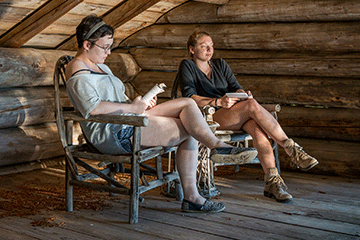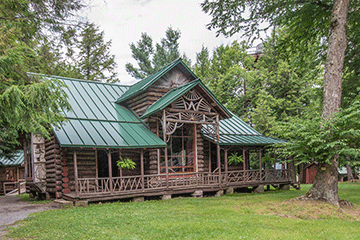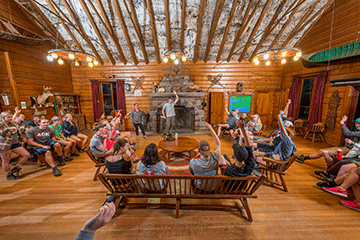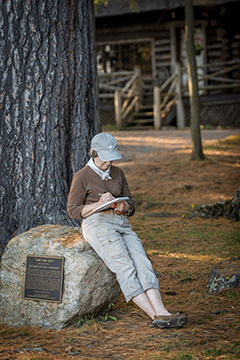
09/22/2023
SUNY Cortland will continue to immerse kindergarten through 12th-grade humanities educators in the Adirondack Mountain settings that helped shape America, thanks to a fifth federal grant to support the university’s “Forever Wild” weeklong summer workshops.
The latest installment of National Endowment for the Humanities (NEH) funding, this time for $190,000, brings the total NEH funding for SUNY Cortland's Adirondack Gilded Age education initiatives to nearly $1.4 million.
The new round of funding will support the recruitment of 60 teachers or librarians from across the country for an unparalleled in-person collaboration on the Gilded Age and Progressive Era (c. 1870s to 1920) from the unique perspective of the wilderness.
Two groups of 30 educators will attend the “Forever Wild: Americans and Their Land in the Gilded Age and Progressive Era” program next year from July 7 to 13 or from July 14 to 20.
“Most participants in NEH grants like this use primary sources, but in our grant, they use primary sources while also inhabiting one,” said SUNY Cortland History Professor Kevin Sheets, who co-leads the NEH “Forever Wild” grant program with his colleague, SUNY Distinguished Teaching Professor Randi Storch.

The visiting secondary educators will stay at the university’s rustic Huntington Memorial Camp at William H. Parks Family Center for Environmental and Outdoor Education, a National Historic Landmark on Raquette Lake built by William West Durant in the 1870s.
“We also give them access to our amazing partner institutions: Great Camp Sagamore, Camp Uncas and the Adirondack Experience Museum,” said Sheets, History Department chair and a 19th century American cultural historian.
Participants will merge their observations and findings into lessons they will bring back to their schools and classrooms.
The program gives the educators the opportunity to develop new understandings of U.S. history and innovative teaching approaches using “place-based” theories and practices, according to Sheets and Storch.
“I think our ‘place-based’ approach is what sets this grant apart,” said Sheets. “We use Camp Huntington as a living classroom, so it is both the place where we host our workshops, but it is also for us a primary artifact that we use and interpret with the participating teachers. That encourages educators to consider the role spaces play in shaping experience and to put different spaces — in our case wilderness and the city — into historical conversation with one another.”

The workshops continue the scholarship the pair started last year as principal co-investigators of another NEH Humanities Initiative grant titled “Re-Placing the Gilded Age and Progressive Era.” Working with 20 history experts at SUNY comprehensive colleges, this research aims to re-“place” the eras, expand the scholarship of the period in the late 19th and early 20th centuries beyond the major cities and timeframe and present it in a wider context. Sheets and Storch are currently drafting a forthcoming book’s introduction and revising the SUNY authors’ submissions. The two-year study through 2024 is supported by a separate $143,000 NEH grant.
“One experience and proposal builds on the learning from the previous one,” Storch, a leading labor historian, said of the intermittent NEH grant-supported workshops dating back to 2012-13.
“That is also true for this round of ‘Forever Wild’ and the way it draws upon what we learned, and continue to learn, through our work on ‘Re-placing the Gilded Age.’ Both grants are challenging traditional approaches to this historical era and using place-based pedagogy to rethink the way we think about and teach history.”
Gonda Gebhardt M ’13, SUNY Cortland associate director of international programs emerita, is managing the project grant monies. Former SUNY Cortland history major Kaycie Haller ’19, now a Ph.D. candidate at SUNY Albany, will be assisting attendees during the workshop.
According to Storch and Sheets, the workshops will pose questions that connect with larger humanities themes including humans and the environment; movement of peoples and ideas; history, memory and politics; and cultural identities, cultural diversity and intercultural relations. The realms of architecture, geography, literature and history provide several entry points for educators from different backgrounds and teaching fields.
Four visiting scholars will participate in the workshops:
- Rebecca Edwards, the Eloise Ellery Professor of History at Vassar College and author of Angels in the Machinery: Gender in American Party Politics from the Civil War to the Progressive Era and New Spirits: Americans in the Gilded Age, 1865- 1905.
- Philip Terrie, professor emeritus from Bowling Green State University and a scholar on the cultural history of the Adirondacks. He authored Forever Wild: A Cultural History of Wilderness in the Adirondacks and Contested Terrain: A New History of Nature and People in the Adirondacks.
- Scott Manning Stevens, an associate professor of Native American studies and English and director of Native American Studies at Syracuse University. A citizen of the Akwesasne Mohawk nation, he serves on the Adirondack Experience Board of Trustees and co-authored Why You Can’t Teach United States History Without American Indians.
- Jennifer Donnelly, New York Times best-selling author of 15 books including the award-winning A Northern Light. This workshop newcomer’s writing is well-regarded among young literature specialists.

A thoughtful scholar pauses in front of Camp Huntington's historic Swiss Chalet.
Previously, Storch and Sheets also captured two NEH grants totaling $378,000 for 2017-18 and 2020-22 to conduct a series of “Common Ground” summer institutes that tied groups of kindergarten through 12th-grade teachers in one week’s worth of immersion in New York City with a second in the Adirondacks.
With the latest round of federal support, Storch and Sheets estimate that they have brought approximately 400 educators to Camp Huntington for this unique program and each of those teachers have regularly shared their experience with an estimated 120 students a year.
“It is fair to say that we have reached 230,000 K-12 students,” Sheets said. “One of our participants, also a Cortland alum, Caitlin Goodwin ’11, M’16, won the Gilder Lehrman New York Teacher of the Year Award.”